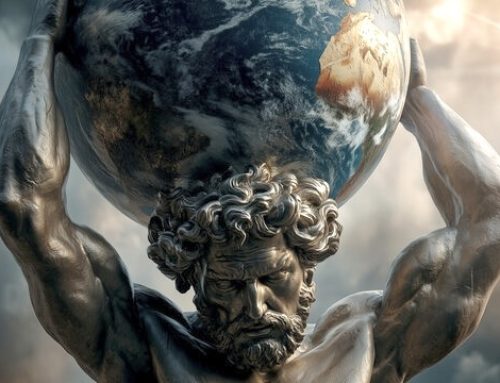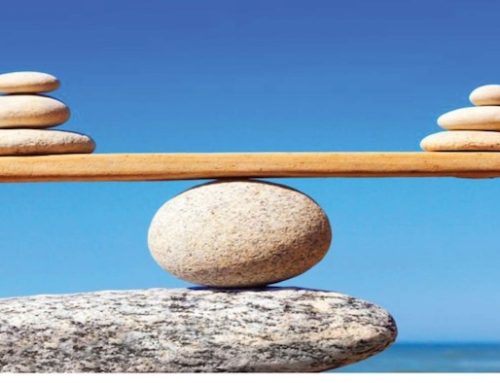Are we there yet?
Kids have no sense of time, which has annoyed parents since the automobile first started rambling across America in the early twentieth century. While parents ruminate about the past and worry about the future, kids just live in the here and now. “What’s for lunch?” is as far as they look forward and yesterday is easily forgotten. In the last few years, however, both kids and adults were on the same page: would the present never end? We all seemed stuck; triangulated between the forces of fear, bewilderment, and boredom. Our world oscillated like a gyroscope with a slightly bowed axis, leaving us in a dizzied state of disorientation. As if we were walking through a hall of mirrors where our reflection is distorted and we struggle to recognize our likeness. Familiarity seemed always just beyond our comprehension. Normal? Get real.
To muddle things further, since the presidency of Trump and the pandemic, it seems we can’t get anything done. Collective action for the greater good has succumbed under the weight of divisive malice. Innovation of any kind, from technology to popular culture has been in a Covid-induced stupor, and violence has become the prevailing currency of all disputes. Notwithstanding the many so-called influencers who pursue fandom on social media, our culture entered a period of mind-numbing stasis. Been wowed by a new technology lately? Inspired by a new young leader? Seen a great new movie? Listened to stunning new music? Been enthralled by a new author? Neither have I. I expect someday historians may look back at this era and call it the Big Dark Pause. The life expectancy of Americans has dropped two years in a row—for the first time in over one-hundred years in 2020, and the second in 2021. There is nothing darker than premature death.
However, this too shall pass.
In historical context, pauses like the current one signal a pivot point after which a new direction, with predictably hopeful enthusiasm, is set anew. We move forward with new norms, expectations, and inspirations. In the meantime, pauses also offer an opportunity to recenter the self in a manner to affect personal orientations and dispositions. To find light in the darkness. Now is the time to prepare, before the gyroscope’s axis straightens. Crises always offer opportunities if we are willing to do the work.
I received a number of inquiries following my August 2 post: “The Identity Trap: Suffering or Transcendence?” that described four phases of life and the keys to avoiding suffering in the last quarter in favor of transcendence. Several readers asked for more input on their own quest to reset their lives as we emerge from our current malaise. What follows here are a number of contemplations to consider. My own journey has been informed by two ancient philosophies: Stoicism and Mindfulness. From Seneca to Buddha. Each is unique. Each is powerful. I have found both to be extremely valuable. I also realized that the only way to make sense of either was through immersion. Between language, time period, and cultural differences, it is difficult to assimilate much of the knowledge that can appear abstract, circular, and paradoxical to the modern western mind. In addition, the confusion one must endure from many teachers using different definitions for the same terms can be quite frustrating. So, my synthesis of contemplations (after wading and wallowing through many books, podcasts, and lectures) is offered below as a utilitarian guide to a personal reset. I have attempted, as best I can, to extract the essence of the ancients in a manner that is both understandable and useful for people like me; for people like you.
Here you go:
- Get naked. (Metaphorically, of course.) If you are over forty-five, let go of your carefully crafted identity you wear like a suit of armor. It may have served you well when you were younger, but if you want to live your life on the path to tranquility rather than suffering—you need to let go of your identity and give your ego a much-needed rest. Our psyche, formed from our beliefs, knowledge, experiences, fears, preferences, and prejudices gets way too much playing time. Keep your heart and mind open. Learning is essential. Focus on crafting wisdom rather than hardening your identity. Being naked as a default state leaves all your options open. You can wear what you want to fit the situation and its circumstances. And, no one will accuse you of becoming a bore—you will never go out of style!
- Reality is what it is. Let it be. Manage your relationship with reality rather than trying to affect reality itself. I have always been a big believer in manifesting my own destiny; in controlling outcomes in my favor. After years of banging my head against that wall, I have awakened to the fact that most outcomes have nothing to do with factors within our control. Thinking otherwise is admirable, but delusional. That is not to say I do not believe one person can’t have an extraordinary impact on the achievement of a particular goal, just that there are too many exogenous variables—outside of our control—that have influence on results in a world that is now as integrated and complex as ours. And, in the last few years, exogenous variables have played a ferocious role in outcomes. Mitigating risk has become an extraordinary challenge. Shifting your control-freak disposition to your relationship with reality—as it is—rather than believing you can affect reality directly is a much saner way to live.
- Die to live. If today was the last day of your life, would you die in peace? If not, why not? Make a list of the why-nots. First, eliminate bucket-list items: things you want to do that amount to little more than ego-satisfiers. It doesn’t mean you eliminate them from your pursuits, but recognize that they are actually superficial in the scheme of dying in a state of peace. Then, identify each item on the remaining list as in your control, or out of your control. Discard—cross out—those items out of your control. This can be difficult, but it makes no sense to trouble yourself with items that you can do nothing about—for whatever reason. Most unresolved issues that remain will come in three flavors: obligations, dependencies, and conflicts. Finally, work your list. The goal is to eliminate as many items as is possible. Once that is done you may die in peace. Of course, you won’t—at least not on that day—but here’s the big payoff: every next day is a gift! Every next day can be enjoyed in a state of liberation. One last caveat: after your liberation, don’t add anything else to that list in the future. That would just be dumb.
- Now is all that matters. Be that kid in the backseat of the station wagon again. Stay present. There is absolutely nothing you can do about the past. Throw away that rearview mirror. Dwelling is dangerous for both mental and physical health. Look to the future to foster hope and aspiration, but don’t fool yourself about expected outcomes. The only moment you can affect with some certainty is the present. Focus on mastery in the moment, one moment at a time. It doesn’t matter if you are washing dishes or performing before a large audience. Everyone benefits: the dishes, the audience, and you. And, those close to you will suddenly find you much more interesting if you pay attention to them in the moment.
- No regrets nor desires. Regrets are about the past and desires are about the future; they are not the now (see #4 above). Moreover, they reflect a dissatisfaction with reality (see #2 above). Their biggest problem, however, is that the give suffering a handhold—a place to land. Virtually all of our suffering comes from wanting things to be other than they are. Regrets and desires cause depression and often lead to rash decision-making when coupled with debilitating ruminations. Some people live their entire lives litigating regrets and chasing desires. We have all known one or more of them. They are human wrecking balls. The better aim is contentment, which is a core element of grace—of practicing courteous goodwill.
- Play the inner game. Internal, not external. The inner game is one that is entirely within our control—where the outcome is certain. External is conditional, which means, by definition, is out of our control. Friends are conditional, and unfortunately spouses are too. Even the pledge of unconditional love is conditioned upon its pledge and honor of the pledger. Happiness can also be conditional if it depends on anything external. To quote William Ernest Henley’s poem, you can be the “master of my fate” and “captain of my soul” if you focus on the inner game. Mastering the inner game will make you stronger than any threat you face in life; the fiercest of warriors and most certain victor. Steel thyself. Be your own best friend. Engage with all the rest with a level of prudent circumspection. Trust others to do what they believe is in their best interest and you will seldom, if ever, feel betrayed. Finally, as the Stoics remind us: it is not what happens that matters, it is how you respond to what happens that matters.
- The only thing that is permanent is impermanence. Nothing lasts. A frustrated student of a Buddhist monk once asked him to define the philosophy of Buddhism in one sentence. The monk did it in two words: “everything changes.” Everything comes and everything goes. This reality affects both the desirable and the undesirable. Fighting change, as with regrets and desires (see #5, above) is a surefire pathway to suffering. This is one of the reasons why clinging, clutching, and grasping are futile. Let it be and let it go. Masochism is not a pathway to transcendence and peace. Reckless reaction and/or determined resistance will not defeat impermanence. Your willpower is better aimed at letting life be life. Your ego will fight you mightily on this, which is why you must redirect your will to achieve a sense of mindful equanimity.
- Simplify. Happiness is simple, it is simplicity that is hard. It is so easy to complicate our lives. The principal beneficiary of complexity is our ego. How many times have you spoken to a friend or family member and sat patiently while they rattled off how busy, complicated, and overwhelming their life is? They are seeking acknowledgment from you to accomplish one thing: feed their ego. Yes, life is busy and can be very hard. But the difficulty is largely of our own making. The vast majority of our responsibilities and burdens in the modern era are self-inflicted. All too often complexity is driven by regrets and desires (see #5, above). We feel we must expand our lives to find happiness. New toys, experiences, friends, and lovers. Want happiness? Seek simplicity. Learn to discard and learn to stop yourself before you reach for that next shiny object. That next Amazon box will not make you happy.
- Fear and anger are toxic. And, they are levers of manipulation—your manipulation. I know no person on the planet that understands this better than Donald Trump. It is how he became president and could be again. Fear and anger act to diminish our power in two ways. The good news is that both are in our control. First, clutching fear and anger cause us to act in ways that violate our fundamental values. Among other things, this creates internal conflict—cognitive dissonance—that is the foundation of mental illness, from simple depression to more disabling mental disorders. Second, if we are provoked by fear and anger our reaction only accomplishes one thing: the transfer of power from ourselves to the provocateur. Action? Good. Reaction? Bad. I am forever amazed at how people take offense and display anger—even hatred—over name calling. Being triggered (to invoke a fashionable term of victimhood) is the moment when the triggered transfers power to the offender. In a state of fear and anger, we can be made to do almost anything; seldom in our own best interest. Why would anyone do that? Keep your power for yourself.
- Leave things better than you found them. One of three key American cultural dispositions that truly made America great, which I wrote about more extensively in Saving America in the Age of Deceit, is the disposition of perfectibility. It is based in the simple belief that we can improve the world we live in and have an obligation—even patriotic duty—to do so. At the very minimum, we must not make things worse (as seems to be the current popular political modality for far too many of our leaders). Buddhism in particular sees this through the belief in connectedness of all living beings (sentient or not). Rejecting separatism (which is an unfortunate western tradition) means we have an obligation to fulfill ourselves and improve the welfare of other beings, each and every day. As the predominant actor on earth, we should accept the responsibility of taking on the greatest challenges for all living beings consistent with the proportional nature of equity. If we did, among other things, addressing climate change would be a no-brainer.
- Practice gratitude—focus your passion on the good. It starts with being aware enough in your life to occasionally pause and let the good land. Then, savor it. I have twelve sources of gratitude that I read back to myself every day; more than once a day if necessary to keep dark clouds away. It is amazing what an elixir gratitude can be. We live on one of the most amazing planets in the entire universe and on one of the most diverse and dynamic continents on that planet in a country that tries (at least historically) to respect our right of self-determination. Vitality and freedom. We are truly blessed. Things could be way worse. Besides being uplifting, gratitude is also empowering. Acting from a position of gratefulness conveys humility and garners instant credibility. The difference between manipulation and persuasion is whose interest is being served. Serving yourself is manipulation; serving others affects persuasion. The sincerely grateful one is the persuasive one.
- Love-and-respect, love-and-respect, repeat, repeat, repeat. Why live otherwise? It is what you want for yourself, so why not treat others in the same manner? This is the most fundamental tenet of all world religions. Pastors, priests, imams, monks, and rabbis may not practice it, but that does not excuse you. Many of our political and business leaders don’t practice it, which is why they must go. Love-and-respect is a grassroots revolution. It starts with each and every one of us. I don’t care if you are a woke Democrat, or a MAGA Republican—quit hating each other. You are only hurting yourself (see #9, above). Every being on the planet wants to be seen, heard, and appreciated. We all have good days and bad. We all have both anxieties and aspirations. Lighten someone’s load and yours will lighten too. If we are to have any chance of saving humanity, we must get this through our thick skulls, and soon. Mother Nature is losing her patience.
I know there is a lot here. Sweet peace does not happen overnight. If you pursue a personal reset, do so with quiet determination. Persevere. You will not achieve perfection—nobody does. Treat your reset as a journey rather than a destination. Your new world awaits. And, it needs you now more than ever.






